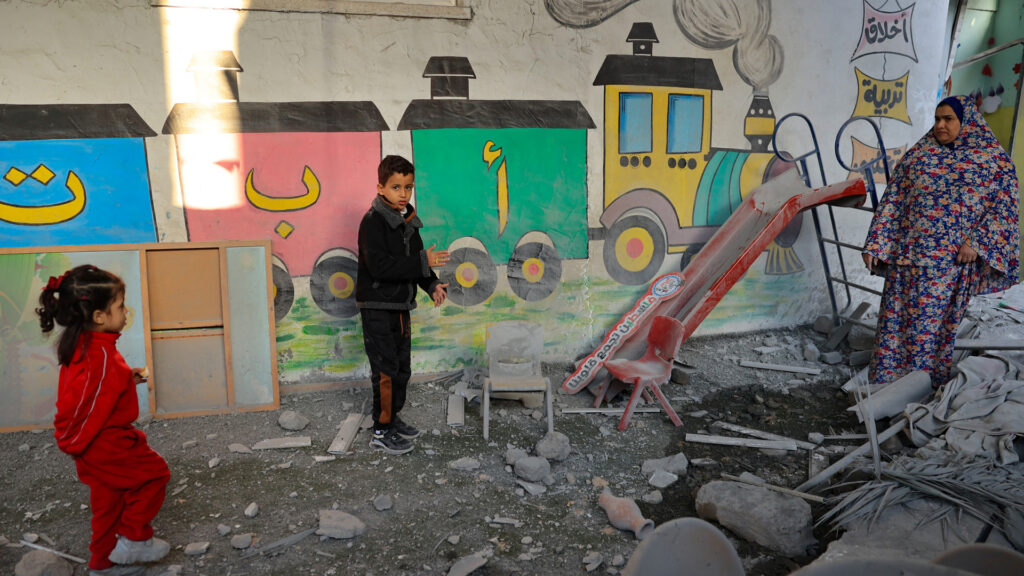On the evening of Friday, 6 October 2023, my aunt Doaa, a kindergarten teacher in Gaza, had just finished preparing new activities for her students. She was excited to see their reactions the next morning.
Tragically, the next day, 7 October, marked the end of any semblance of normal life and the beginning of a war that shattered everything.
Since then, Israeli air strikes have pounded every corner of Gaza – homes, hospitals, schools, and even kindergartens have not been spared.
Doaa’s house was reduced to a heap of rubble, burying her teaching materials and the toys she had bought for her students – children who deserved to live.
Last winter, after Israeli forces withdrew from her neighbourhood, she returned home to sift through the debris. She searched for her memories – personal keepsakes – and her teaching tools – music notebooks, geometric shapes, animal figurines.
When all that turned up was an alphabet book and a few illustrated storybooks, she placed them in a small box alongside salvaged clothes and utensils, as if they whispered to her: “Don’t give up. There’s still hope.”
New MEE newsletter: Jerusalem Dispatch
Sign up to get the latest insights and analysis on
Israel-Palestine, alongside Turkey Unpacked and other MEE newsletters
From rubble to resolve
Like her home, Israeli bombs had reduced Doaa’s kindergarten classroom to ruins.
Months later, however, driven by her passion for education and refusal to let Gaza’s children fall prey to ignorance, she secured a small room in a neighbourhood of the Maghazi refugee camp to start anew.
The room was far from ideal for teaching young children: bare, colourless, and without the green garden or playground of her destroyed kindergarten.
During lessons, sudden explosions send children dropping their pencils to cover their ears. Doaa calms them with games and reassurance, though the war’s scars run deep
Yet Doaa worked tirelessly to make it a safe space.
She hung colourful wallpaper, installed a blackboard, and, despite Gaza’s siege and soaring prices, provided paints, stationery and a speaker for motivational songs to ease the children’s fears before lessons.
Only 13 students, all from nearby, enrolled.
Many parents, gripped by fear of random bombings and hampered by Gaza’s broken communication networks, kept their children away.
Before the war, students rode a bus to kindergarten and returned home safely. But what little security existed back then has been shattered by daily terror.
Those who attend Doaa’s class come with an older sibling or parent, whispering warnings to avoid streets patrolled by “quadcopter” drones – small, deadly machines that mimic cries for help or ambulance sirens to lure and attack people.
Teaching under terror
During lessons, sudden explosions send children dropping their pencils to cover their ears. Doaa calms them with games and reassurance, though the war’s scars run deep.
She notices how it has reshaped their minds.
Instead of chatter about colouring books or crayons, their conversations revolve around politics, flour prices and scarce goods.
Follow Middle East Eye’s live coverage of the Israel-Palestine war
Teaching five-year-olds the alphabet in this reality is daunting, Doaa tells me.
When she introduces the letter “A” with the word “apple”, their eyes fill with longing. They stray from the lesson, confessing how they miss fruit, chicken or chocolate.
Inspired by the stories she reads to them, they dream of a magic genie to grant their wishes.
Osama wants a watermelon; Mira dreams of flying to an amusement park; Sobhi longs for a bicycle and for his father’s job to return; Ezz wishes for new Eid clothes; Majd simply prays for the war to end and death to stop.
When I ask Doaa about the hardest question her students have posed, she recalls a child asking her when the war will end.
They ask with such trust, believing their teacher holds the answer. Doaa offers hopeful responses like, “Soon, we’ll return to our beautiful kindergarten”, though she knows some remain unconvinced, which weighs heavily on her heart.
Dreams deferred
Doaa feels powerless before her students’ dreams – basic needs that children elsewhere take for granted. How have food and toys become wishes that only a genie could fulfil?
Each of the 13 children in her class also carries a unique story of loss.

War on Gaza: My son was born into a world on fire
Read More »
Some live in tents after losing their homes. Others suffer broken teeth and frail bodies from hunger and malnutrition. Many have lost family members.
Ezz, for instance, lost his grandfather and uncles in a strike on his grandfather’s house. During a condolence visit, Doaa saw his mother weeping inconsolably as Ezz stood beside her, grasping the meaning of death and loss for the first time – concepts that Israel forces Palestinian children to learn too soon.
Sobhi, named after his mother’s brother who was killed in an earlier war, bears a name that ties a painful past to an even crueller present.
Yet amid the brutality of Israel’s genocide and occupation, Doaa clings to her alphabet book and a stubborn hope that her students can learn words beyond death and war.
On their behalf, she urges the international community to act swiftly to protect Gaza’s children, ensure their right to safe education, and create a world where their childhoods can thrive and young wings can soar.
The views expressed in this article belong to the author and do not necessarily reflect the editorial policy of Middle East Eye.


